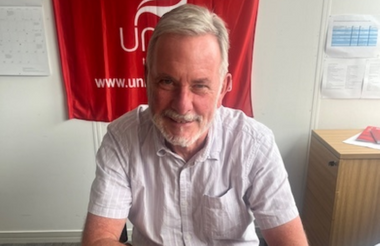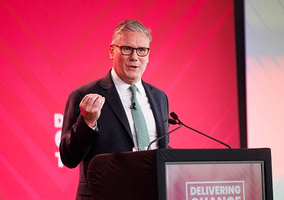Unite has a proud history of fighting against poverty and injustice as demonstrated by our recent campaigns around the withdrawal of winter fuel payments for pensioners, the cutting of disability benefits, and international aid.
The union is continually campaigning for better levels of funding for public services that support the poorest and weakest in our society. In undertaking these campaigns, Unite has appreciated the support from many charities that work in the affected areas.
We know times are tough for charities. Funding is increasingly hard to come by, and across the board need is growing. This is especially true as government cuts result in further outsourcing to the charity sector for services previously delivered by the state.
At the same time, staff who work for charities are increasingly faced with the grim prospect of further stagnating wages coupled with ever-growing workloads and, increasingly, redundancies.
Yet sadly, in too many cases, not-for-profit employers make decisions about pay and conditions without negotiation or discussion. Budgets are presented to our members that have not even considered the need for a cost-of-living increase for hard-working staff, while there is a trend in the sector to increase the pay of senior management while cutting jobs and conditions for lower-paid staff.
People work for the sector because they care, but an organisation that is planning to make employees poorer year on year by not matching inflation arguably doesn’t care the same way about them and their families.
Often, charities can make the situation worse by telling staff that they should be grateful for jobs in a sector where they have greater “purpose” than the private sector. In the worst cases, charity employers will even suggest that fairness for charity workers - without whom charities can do nothing - is at odds with delivering for the people that rely on the charity’s work.
This is a false economy, especially in the midst of a prolonged cost-of-living crisis. The charity sector cannot run on the good will of workers, and no matter how committed you are to serving a charitable mission, no amount of commitment can keep you in a job when you can’t afford your bills.
The central purpose of trade unions such as Unite is to improve the pay and working conditions of its members but in doing so, we recognise that sometimes that cannot be achieved without ensuring that the organisations for which are members work are properly resourced.
Undoubtedly, many of the solutions lie in wider social changes, such as increased government funding, and new ways of tendering and commissioning for vital services that doesn’t encourage a race to the bottom, eroding the resources available to deliver to those in need.
Where those organisations are largely resourced by central or local government, we believe government needs to look at new ways of financing those activities, which is why we are currently advocating for a 1% wealth tax, which we believe can raise an additional £25bn a year for public services including those delivered by the charity sector.
In seeking to achieve social justice, an independent trade union such as Unite will often find itself advocating changes in both government policy and highlighting practices by employers which need to be changed. This may appear to bring the union into “conflict” with the government and individual employers.
However, by taking these stances, Unite is simply reflecting the policy positions agreed by members through our democratic structures, including at the workplace level. Unions are democratic organisations, where members elect workplace representatives, and democratically make decisions about the issues that matter to them.
Employers can choose to engage with staff however they like, but when it comes to how they organise that will always be the decision of the workers themselves. Most of us have no power as individuals to influence decisions made by employers; the only realistic means that workers have to change that is by coming together to act collectively. In deciding what action to take, it is workers, not officials like me, who make the decisions.
Unite does not want its relationship with employers in the charity sector to be defined as conflictual and will always raise issues through collective bargaining processes. Our members at Z2K, who are motivated in their work to fight poverty, took exception to a proposal to drastically increase pay inequality at the organisation. When no agreement could be reached, our members voted to take industrial action through a lawful ballot.
Unite is pleased that we reached a resolution to that dispute and that we continue to support our members there in seeking to resolve collective issues.
Related articles












